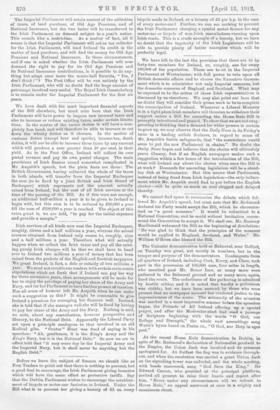We have dealt with the most important financial aspects of
the Bill elsewhere, but must note here that the Irish Parliament will have power to impose new internal taxes and also to increase or reduce existing taxes, under certain limita- tions. In the matter of the excise duties it will have a com- pletely free hand, and will therefore be able to increase or cut down the whisky duties as it chooses. In the matter of customs duties (except beer and spirits), income-tax, death duties, it will not be able to increase these taxes by any amount which will produce a sum greater than 10 per cent. in their yield. As to the Post Office, Ireland will collect its own postal revenue and pay its own postal charges. The main provisions of Irish finance sound somewhat complicated in Mr. Asquith's speech, but the plain facts are these: The British Government, having collected the whole of the taxes in both islands, will transfer from the Imperial Exchequer the sum (to be fixed by a joint British and Irish Board of Exchequer) which represents not the amount actually raised from Ireland, but the cost of all Irish services at the time of the passing of the Bill. As if this were not enough, an additional half-million a year is to be given to Ireland to begin with, but this sum is to be reduced by £50,000 a year till the sum of £200,000 a year is reached. The object of this extra grant is, we are told, "to pay for the initial expenses and provide a margin."






































 Previous page
Previous page